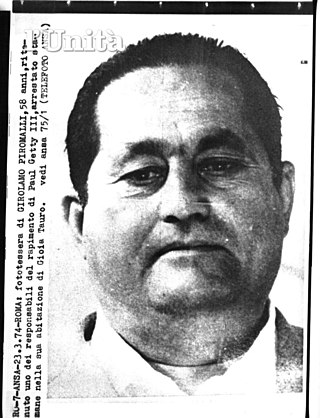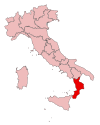Related Research Articles
The 'Ndrangheta is an Italian Mafia-type association based in the peninsular region of Calabria and dating back to the 19th century. Although loosely structured, it is considered one of the most powerful organized crime groups in the world. It is characterized by a horizontal structure made up of autonomous clans known as 'ndrine, based almost exclusively on blood ties. Since the 1950s, following wide-scale emigration from Calabria, 'Ndrangheta clans dispersed to other European countries, Australia and the Americas. Currently, its main activity is drug trafficking, but it also deals with arms trafficking, money laundering, racketeering, extortion, and loan sharking.

Antonio Macrì, popularly known as Zzi 'Ntoni, was a historical and charismatic boss of the 'Ndrangheta, a criminal and mafia-type organisation in Calabria, Italy. He was born in Siderno on the Ionian coast of Calabria and was the capobastone of the 'ndrine in his hometown.
A capocrimine is the elected boss of the crimine, an annual meeting of the 'Ndrangheta locali near the Sanctuary of Our Lady of Polsi in the municipality of San Luca during the September Feast. Far from being the "boss of bosses", the capo crimine actually has comparatively little authority to interfere in family feuds or to control the level of interfamily violence.

The 'ndrina is the basic unit of the 'Ndrangheta of Calabria, made up of blood relatives, and is the equivalent of the Sicilian Mafia’s "family" or cosca. The word derives from Greek, meaning "a man who does not bend". Each 'ndrina is "autonomous on its territory and no formal authority stands above the 'ndrina boss." The 'ndrina is usually in control of a small town or a neighbourhood in larger cities, even outside Calabria, in cities and towns in the industrial North of Italy, in and around Turin and Milan.

Girolamo Piromalli, also known as Mommo, was an Italian mobster and member of the 'Ndrangheta. He was capobastone of the Piromalli 'ndrina based in his home town Gioia Tauro on the Tyrrhenian coast of Calabria.
Giuseppe Nirta, was a historical boss of the 'Ndrangheta, a Mafia-type organisation in Calabria. He hailed from San Luca in Calabria. Together with his brothers Antonio, Francesco and Sebastiano, he ruled the town, a stronghold of the 'Ndrangheta.
Antonio Nirta was a boss of the 'Ndrangheta, a Mafia-type organization in the Italian region of Calabria. Together with his brothers Giuseppe, Francesco, and Sebastiano, he ruled San Luca, a stronghold of the 'Ndrangheta.

The Piromalli 'ndrina is one of the most powerful clans of the 'Ndrangheta, a criminal and mafia-type organisation in Calabria, Italy. The 'ndrina is based in Gioia Tauro on the Tyrrhenian coast. The Piromalli's are allied with their relatives of the Molè family, also from Gioia Tauro. Often they are referred to as the Piromalli-Molè clan. The Piromalli clan contains more than 200 members.
The De Stefano 'ndrina, or the De Stefano family or De Stefano-Tegano family, is one of the most powerful clans of the 'Ndrangheta, a criminal and mafia-type organisation in Calabria, Italy. The 'ndrina hailed from the Archi neighbourhood in Reggio Calabria. Several of its members were included in the list of most wanted fugitives in Italy. According to prosecutor Salvatore Boemi, the De Stefanos are the representation of the manager-criminal controlling a crime multinational with joint ventures with Raffaele Cutolo from the Camorra and Nitto Santapaola and Francesco Ferrera from Cosa Nostra in Catania.
The Cataldo 'ndrina is a clan of the 'Ndrangheta, a criminal and mafia-type organisation in Calabria, Italy. This particular 'ndrina is based in Locri, a hotbed of 'Ndrangheta activity. The clan, allied with the Marafioti family, is involved in a long blood feud with the Cordì 'ndrina, from the same town, since the end of the 1960s.
The Barbaro 'ndrina is a powerful clan of the 'Ndrangheta, a criminal and mafia-type organisation in Calabria, Italy. The 'ndrina belongs to the locale of the town of Platì. According to the Direzione Investigativa Antimafia, the Barbaro 'ndrina is one of the most powerful 'Ndrangheta clans. The clan also operates in the northern Italian regions of Lombardy, Piemonte and overseas in Australia, in particular in the Griffith, New South Wales area.
The Second 'Ndrangheta war was an internal struggle in the 'Ndrangheta, a criminal organisation in Calabria. The conflict raged from 1985–1991 in Reggio Calabria. Practically all the 'ndrine in the city of Reggio Calabria grouped into either one of two opposing factions: the Condello, Imerti, Serraino and Rosmini clans on one side, and the De Stefano, Tegano, Libri and Latella clans on the other.
Giorgio De Stefano is an Italian criminal and a member of the 'Ndrangheta in Calabria, a Mafia-type criminal organisation in Calabria. He belongs to the De Stefano 'ndrina, based in the Archi neighbourhood in the city of Reggio Calabria, and is a cousin of the historical boss Paolo De Stefano. He has a degree in criminal law and is often referred to as "the lawyer". According to anti-mafia investigators, he represents "the brains" of the De Stefano clan, able to elaborate alliances and strategies, with a typically managerial approach, identifying the most lucrative criminal activities to be implemented.
Paolo Serraino, is an Italian criminal and a member of the 'Ndrangheta in Calabria. He was born in Cardeto, about 10 km southeast of the city of Reggio Calabria.
The Serraino 'ndrina is a clan of the 'Ndrangheta, a criminal and mafia-type organisation in Calabria, Italy. The 'ndrina is based in Cardeto, about 10 km southeast of the city of Reggio Calabria. The Serraino clan is made up of two groups of brothers, first cousins.
Domenico Oppedisano is an Italian criminal and a member of the 'Ndrangheta, a Mafia-type organisation in Calabria. He is based in Rosarno.
The Camera di Controllo, is a collegial body of the 'Ndrangheta, a Mafia-type organisation in Calabria. It is also known as La Provincia or Camera di Compensazione. It is composed of leading 'Ndrangheta members to decide on important questions concerning the organization and settling disputes.
The crimine is an annual meeting of the 'Ndrangheta, a Mafia-type organisation in Calabria. The meeting is held near the Sanctuary of Our Lady of Polsi in the municipality of San Luca during the September Feast. At least since the 1950s, these annual meetings have traditionally served as a forum to discuss future strategies and settle disputes among the locali – all the 'ndrine in a specific town or territory. The assembly exercises weak supervisory powers over the activities of all 'Ndrangheta groups.
Giuseppe Pelle is an Italian criminal from San Luca, and member of the 'Ndrangheta, a Mafia-type organisation in Calabria. He is the son of Antonio Pelle, also known as Ntoni Gambazza, the capo crimine, the ceremonial head of the 'Ndrangheta.

The First 'Ndrangheta war was an internal struggle in the 'Ndrangheta, a Mafia-type criminal organisation in Calabria. The conflict raged from 1974 to 1977 and resulted in approximately 233 deaths. The war broke the equilibrium in the triumvirate, made up of Antonio Macrì, Domenico Tripodo and Girolamo Piromalli, that had ruled the 'Ndrangheta for 15 years, and facilitated the rise of a new generation 'Ndranghetisti, in particular the De Stefano 'ndrina, who wanted to involve the 'Ndrangheta in new, more lucrative criminal activities.
References
- (in Italian) Gratteri, Nicola & Antonio Nicaso (2006). Fratelli di sangue , Cosenza: Pellegrini Editore, ISBN 88-8101-373-8
- Nicaso, Antonio & Marcel Danesi (2013). Made Men: Mafia Culture and the Power of Symbols, Rituals, and Myth , Rowman & Littlefield Publishers, ISBN 978-1-4422-2227-4
- Paoli, Letizia (2003). Mafia Brotherhoods: Organized Crime, Italian Style , New York: Oxford University Press ISBN 0-19-515724-9 (Review by Klaus Von Lampe) (Review by Alexandra V. Orlova)
- Varese, Federico. How Mafias Migrate: The Case of the 'Ndrangheta in Northern Italy , Discussion Papers in Economic and Social History, Number 59, University of Oxford, July 2005
